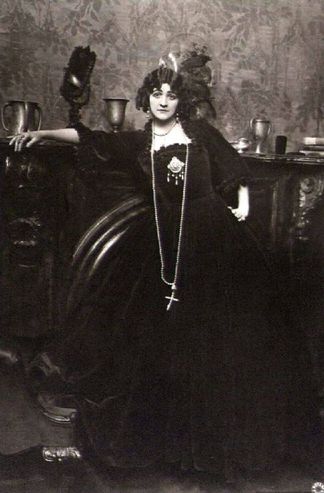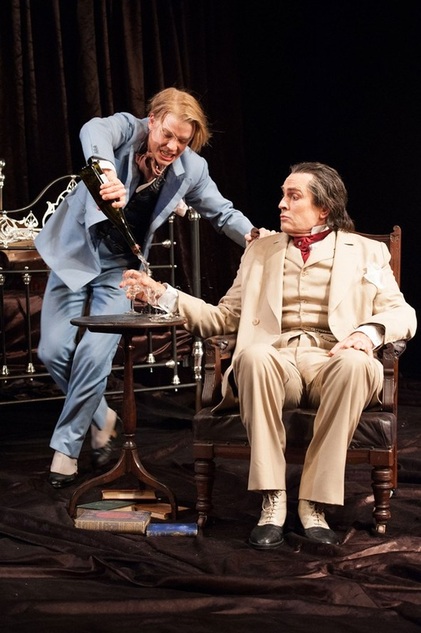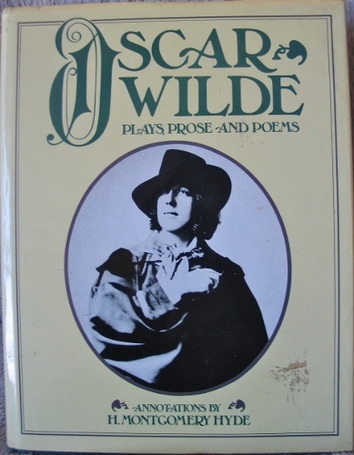|
The Duke of York's theatre is a small but perfectly formed, compact theatre on St Martin's Lane, in the heart of London's West End. It was originally called the Trafalgar Square and changed its name in 1900 in honour of the future King George V. It is in this very same theatre that Equity, the actors' union, was created in 1929. In the theatre's circle bar, you can see the plaque which commemorates this important event, as well as a framed initial "contract" with now faded signatures. I need to do some more research to find out whose names are on there. As you make your way up the stairs to get to the circle, you pass a gorgeous photo of American actress Doris Keane in her role as Margherita Cavallini in Edward Sheldon's Romance. I collect postcards and pictures of actresses (Victorian, Edwardian, 20s, etc.) and when I saw this portrait, the only thing I could think of was "WANT!" The Judas Kiss, written by David Hare and directed by Neil Armfield, focuses on two critical moments late in Oscar Wilde's life: the evening before his arrest at the Cadogan hotel and one night in Naples after his release, a little more than two years later. There are beautiful, poignant moments; it is often incredibly funny, courtesy of Oscar Wilde's famous wit. Rupert Everett as Wilde is fascinating - and unrecognisable, his face powdered, his gait larger, his body seemingly burdened by the weight of his life. He is in turns flamboyant, prancing, carefree, provocative, generous, distracted, despairing and dismayed but always full of that famous wit and humour. His Wilde is a crushed man, destroyed by his own instincts, society's hypocrisy and cruelty, and, ultimately, by his love for his much younger lover, Bosie - Lord Alfred Douglas. Freddie Fox (Bosie) lends his pretty boy looks to a rather unsympathetic character, a devious, self-serving, tantrum-prone, snobbish and weak aristocrat who delivers the Judas Kiss of the title, ultimately abandoning an ill and penniless Oscar in his grim Naples dwelling. Very much like Dorian Gray, Bosie's pleasant exterior hides the sulphurous smell of a rotten, decaying being devoid of compassion. It is incredibly tragic to witness the demise of a creative genius whose strength had been an incredibly lucid understanding of the human condition and its grotesque rules and conventions, only to fall victim to his over-romantic soul. Oscar Wilde, a man in love with everything beautiful and linked to the aesthetic movement, ends his days in a sordid little house in Naples, away from the splendour and intellectual abundance he has always fed on. It was wonderful to see Oscar Wilde come to life in this gripping play. I have been a fan for a long time. I have on my shelves a wonderful illustrated book called Oscar Wilde, plays, prose and poems, packed-full with photos and illustrations (by among others one of my favourites, Aubrey Beardsley, one of Wilde's collaborators) and Wilde's writings. And Oscar Wilde's short story, The Canterville Ghost, features in my second novel, The Book of Thoth... I was rather sad to notice that the London theatre-going crowds were as addicted to their stupid mobile phones as anyone else. It is rather pathetic to see people holding on to their little electronic devices as if they were oxygen bottles, even as the announcement was asking the audience to switch off their phones. Then at the interval, here it was again, that desperate switching on of devices with clenched jaws, as if the first act of the play had been a mere inconvenience interfering with their uneventful, unproductive interconnectivity addiction. What were they so desperate to do on there? Facebook that "Oooh, I even saw a willy or two?" (yes, there is male nudity in this show).
Do people realise how idiotic they look staring at their little screens with feverish eyes? I even saw a middle-aged woman get out of the toilets looking at her phone, then standing in front of the mirrors re-applying lipstick whilst still looking at her blooming thing. I tell you what, I would probably look like The Joker if I attempted this trick! *sigh* And then, after the actors had left the stage after the Encores, as soon as the lights came on, everyone switched their things on again, their brains not being allowed the time to reflect on what they had just seen. One minute in and they had already forgotten about the play, already twittering and facebooking and thinking about the next thing they would consume, their brains paralysed by the palid glare of their screens illuminating their glazed-over eyes... Comments are closed.
|
AuthorI think therefore I write. Archives
June 2024
CategoriesAll Art Books Cinema Culture Events Idea Ideas Inspiration Inspirations Literature Music People Places Promo Publishing Reading Reviews Self Publishing Self Publishing Self-publishing Society Theatre Thoughts Working Work In Progress Work In Progress Writing Writings |



 RSS Feed
RSS Feed
